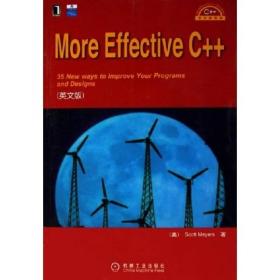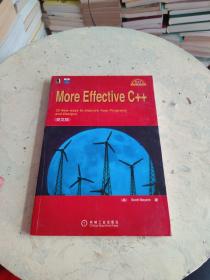
More Effective C++
¥ 75.42 ¥ 39 九五品
仅1件
作者[美]迈耶斯
出版社机械工业出版社
ISBN9787111188308
出版时间2006-04
版次1
装帧平装
开本16开
纸张胶版纸
页数318页
定价39元
上书时间2024-12-05
- 最新上架
商品详情
- 品相描述:九五品
- 商品描述
-
基本信息
书名:More Effective C++
定价:39.00元
作者:[美]迈耶斯
出版社:机械工业出版社
出版日期:2006-04-01
ISBN:9787111188308
字数:
页码:318
版次:
装帧:平装
开本:16开
商品重量:
编辑推荐
内容提要
目录
AcknowledgmentsIntroductionBasicsItem1:Distinguish between pointers and references.Item2:Prefer C++-style casts.Item3:Never treat arrays polymorphically.Item4:Avoid gratuitous default constructors.OperatorsItem5:Be wary of user-defined conversion functions.Item6:Distinguish between prefix and postfix forms of increment and decrement oferators.Item7:Never overload &&,︴︴,or,.Item8:Understand the different meanings of new and delete.ExceptionsItem9:Use destructors to Prevent resource leaks.Item10:Prevent resource leaks in comstructors.Item11:Prevent exceptions from leaving destructors.Item12:Understand how throwing an exception differs from passing a parameter or calling a virtual function.Item13:Catch exception by reference.Item14:Use exception specifications judiciouslyItem15:Understand the costs of exception handlingEfficiencyItem16:Remember the 80-20 rule.Item17:Consider using lazy evaluation.Item18:Amortize the cost of expected computations.Item19:Understand the origih of temporary objects.Item20:Facilitate the return value optimization.Item21:Overload to avoid implicit type conversions.Item22:Consider using op=instead of stand-alone op.Item23:Consider alternative libraries.Item24:Understand the costs of virtual functions,multiple inheritance,virtual base classes,and RTTl……
作者介绍
Scott Meyers拥有布朗大学计算机科学博士学位,是世界上的C++软件涵盖发之一。他的“More Effective C++两卷本”(《Effective C++》和《 More Effective C++》),开辟了技术图书写作的新风格。他曾担任《C++Report》杂志的专栏作家,经常为《C++ Users Journal》和《Dr.Dobbs Journal》撰稿。
序言
-

【封面】
相关推荐
-

More Effective C++
九五品廊坊
¥ 78.73
-

More Effective C++
九品北京
¥ 73.24
-

More Effective C++
九品北京
¥ 73.19
-

More Effective C++
八五品北京
¥ 75.60
-

More Effective C++
全新汕头
¥ 200.00
-

More Effective C++
九品邯郸
¥ 95.00
-

More Effective C++
九品邯郸
¥ 108.00
-

More Effective C++
全新广州
¥ 187.00
-

More Effective C++
八五品广州
¥ 50.00
-

More Effective C++
八五品重庆
¥ 90.00
— 没有更多了 —











以下为对购买帮助不大的评价